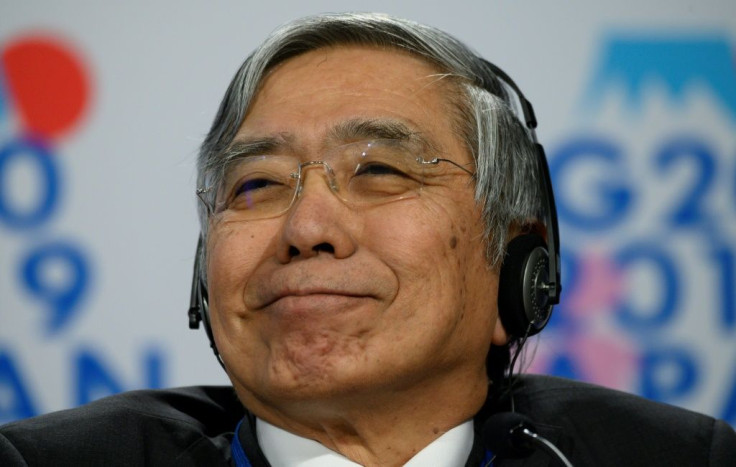Bank Of Japan Holds Rates But Hints At Future Cuts

The Bank of Japan held fire on monetary policy Thursday but hinted at possible interest rate cuts in the future, reflecting its fears that global risks could weigh on the country's fragile recovery.
The announcement came just hours after the US Federal Reserve cut its benchmark interest rate for the third straight time as it looks to shore up the world's top economy.
After its latest policy meeting the BoJ said it expected borrowing costs "to remain at their present or lower levels", marking a slight change of tack.
Previously it had not made reference to the possibility of lower levels, saying instead it expected to keep "current ultra-low rates for an extended period of time, at least until the spring of 2020".
Thursday's announcement dropped reference to that timeframe, hinting that a change could come sooner.
Policymakers warned that a pick-up in the global economy is likely to be delayed "mainly due to the intensified US-China trade friction as well as slowdowns" in emerging economies including China.
"Japan's economy is expected to grow temporarily at a somewhat slower pace than its potential", reflecting weak exports and a sales tax hike that came into effect on October 1, it said.
"With changes in the forward guidance, we made clear that our policy stance is we will carry out policies giving more consideration to the direction of easing," bank governor Haruhiko Kuroda told reporters.
But he also said the BoJ kept its current policy unchanged because it expects prices will continue rising, though at a slow pace.
The change in the forward guidance "will be helpful to stem worries over the negative impact from the October 1 sales tax hike", Hideo Kumano, chief economist at Dai-ichi Life Research Institute, told AFP.
But he said the overall picture was one of little change, adding "there is optimism over global risks" such as US-China trade friction and Brexit.
The bank revised down its inflation forecasts, saying it expects prices to rise 0.7 percent in the year to March 2020, from a previous forecast of 1.0 percent, and well short of its years-long target of two percent.
It also revised down its forecast for the following year to 1.1 percent from 1.3 percent, and downgraded its projection for the year to March 2022 from 1.6 percent to 1.5 percent.
The BoJ has consistently fallen short of hitting the two-percent target it considers key to turbocharging the stuttering economy, despite a barrage of stimulus and monetary easing packages.
It has argued that prolonged periods of low growth and inflation have created a "deflation mindset" that continues to weigh on the national economy.
In a statement, it said there had been "no further increase in the possibility that the momentum towards achieving the price stability would be lost".
But it warned at the same time that "it was necessary to continue to pay close attention to the possibility".
Economic growth forecasts were also cut, with expansion of 0.6 percent tipped for the year to March, 0.7 percent for the following year and 1.0 percent for the year to March 22.
© Copyright AFP 2024. All rights reserved.





















